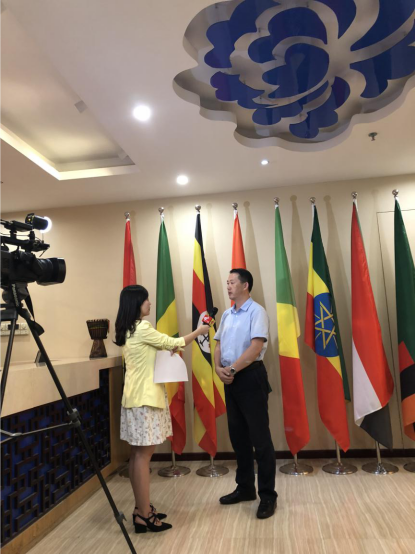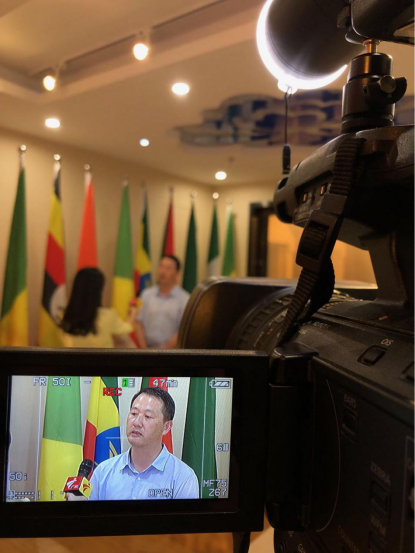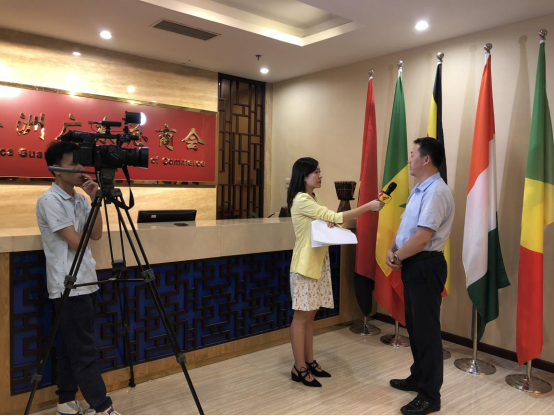On the eve of 2018 Beijing summit of the Forum on China-Africa Cooperation (FOCAC),Professor Liu Jisen was interviewed by Xiao Yangyang, a reporter from GRT Satellite Channel. The interview content is as follows.

Xiao Yangyang (hereinafter referred to as Xiao): What is the significance of FOCAC to be held in China after twelve years? China-Africa diplomacy is one of China's host diplomacy, and the forum develops into summit. So what do above signals reveal?
Liu Jisen (hereinafter referred to as Liu): In 2006, FOCAC was held in China. In 2015, it was held in Johannesburg, South Africa. After twelve years, China hosts the forum again, which shows that China attaches great importance to China-Africa cooperation. Besides, it reflects that tremendous changes have taken place home and abroad in the past twelve years. Internationally speaking, Global Economic Crisis hits global economy hard; Protectionism has risen these years; Brexit hinders European integration; the trend of anti-globalization becomes more and more obvious; and the world economy recovers slowly. Domestically speaking, since Global Economic Crisis, China's economy has entered a period of new normal; the “Belt and Road Initiative” was proposed in 2013; the 19th National Congress marked the beginning of a new era of socialism with Chinese characteristics; two hundred-year goals was put forward; the idea of building a new open economy system and a common community of a common destiny by means of international and domestic markets and resources is highly advocated. FOCAC serves as an important platform for the realization and application of above initiatives and theoretical practices.
FOCAC is China's most important host diplomacy this year. As a continuation of Johannesburg Summit, Beijing summit will make a summary of ten cooperation achievements mentioned by President Xi at the last summit. Beijing summit also marks a new era for China-Africa cooperation. President Xi will deliver an important keynote speech, comprehensively clarifying China's new ideas on strengthening China-Africa relation, announcing new actions and new initiatives for China-Africa cooperation, and further developing China-Africa cooperation.

Xiao: What contributions will 2018 Beijing summit of FOACA make to the “Belt and Road Initiative”? What strategic value does Africa own for the “Belt and Road Initiative”?
Liu: 2018 Beijing summit of FOACA will invite more African countries to join the “Belt and Road Initiative”.
The population of China and Africa adds up to about 2.6 billion, accounting for about one-third of the world's population. The trade volume between China and Africa increased from 765 million U.S. dollars in 1978 to more than 170 billion U.S. dollars in 2017. China has maintained its position as Africa's largest trading partner for many years. Africa is also China's third largest overseas investment market and the second largest overseas engineering contracting market. In 2016, the contract amount of new engineering contracting was 82.1 billion US dollars, with an increase of nearly 30% over 2012. China has built more than 5,000 kilometers of railways and highways for African countries, and trained more than 160,000 talents. Since 1963, up to now, China has dispatched more than 20,000 medical personnel to African countries, made a diagnosis and gave a treatment to nearly 200 million African patients. The cultural exchanges between China and Africa has gone on well. The total number of friendly provinces and cities has reached more than 130. In 2016, China provided 10036 overseas students from African countries with scholarships. The African continent has a vast territory and a large number of countries. Its economy develops rapidly and complements China's. The concept of the “Belt and Road Initiative” is in line with Africa's willingness to explore their own development path independently. These days, many African countries begin to learn from China's experience in reform and opening up. Therefore, Africa plays a significant role in the “Belt and Road Initiative”.

Xiao: This year marks the fifth anniversary of the “Belt and Road initiative”. What changes do you think have taken place in the investment and development of Chinese enterprises in Africa over the past five years?
Liu: The “Belt and Road Initiative” has promoted China-Africa cooperation. These days more and more Chinese enterprises are trading and investing in China. These enterprises introduce the industry chain into industrial parks to form the supporting advantages. Apart from international capacity cooperation in Africa's industrialization, China-Africa agricultural cooperation and cooperation in poverty reduction, capitals flow into the field of culture, education, sports, tourism, health, security, archaeology, and even beauty salon.
Xiao: What are the opportunities and challenges for South-South cooperation?
Liu: There are three opportunities for South-South cooperation, including the trade opportunity based on complementarity, the investment opportunity based on factor endowment, and the cultural exchange opportunity based on African cultural diversity. There are four risks, including political risk, legal risk, market risk and the risk of cultural conflict.
Xiao: Is there any highlight of Guangdong-Africa cooperation? How about the future plan?
Liu: Guangdong's private economy functions active, and private enterprises' investment in Africa develops well. For example, Hua Jian Light Industrial Park, Pearl River Special Economic Zone and Uganda Agricultural Industrial Park develop quite well.
Guangdong-Africa cooperation will focus on agriculture and the promotion of Chinese traditional medicine in the future.

